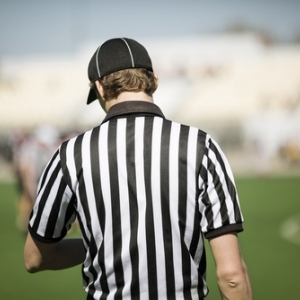Youth Sports Officials: Focusing on the Kids

Being a youth sports official isn't easy. The job involves far more than calling strikes and marking players out of bounds, and taking this role means seeing the game from a child's point of view. To children, every game is the most important one. This simple guide to youth athletics officiating offers more than the duties of referees and other officials; it outlines the roles coaches and parents can play to make youth sports more fulfilling for everyone involved.
Kids Love Game Day
Some sports officials see game day as a brief hassle to endure on the path to receiving a paycheck. But to children, game day is the most important day of the week. It impacts their win-loss record, and to them, it's as important as the games they'll play in high school, college and beyond. It's important that officials go into game day with the same anticipation as the kids. They should be enthusiastic, focused and ready to help young athletes improve. When the job of officiating a youth sports competition is handled correctly, it can be a deeply enriching experience.
Helping Kids Improve
Coaches and parents do much of the practicing with their little ones. Coaches hold official practice sessions, while parents offer pointers when shooting hoops or scoring goals in the backyard. However, officials play a larger role in the teaching process than many kids, parents and coaches think. The National Youth Sports Officials Association (NYSOA) reminds officials that they must possess outstanding communication skills to interact with players in a manner that helps them understand the rules of the game and use that knowledge to improve.
Keep the Game Fair
Every official holds a position of authority, and that authority is used to keep competition fair and positive for players on all sides. Officials must understand all of the rules of the sports they're officiating to ensure both teams or competitors are given an equal opportunity to win. NYSOA offers a long list of online training sessions and in-person clinics to help youth sports officials become familiar with the latest rules and regulations, as well as the officiating practices that help kids succeed in sports and beyond.
Keep Players Safe
One of the most important roles of a youth athletics official is to ensure the sport is performed safely. Of course, keeping players safe includes implementing the rules of the game and intervening during arguments among players, parents and coaches. Yet it also means examining the playing field and youth sports uniforms to keep them free of safety hazards. Each player's uniform and equipment must be checked before competition to ensure both sides are playing as fairly and safely as possible. Parents can ensure their kids are using the proper uniforms and equipment by purchasing gear from a company that focuses solely on providing high-quality athletic wear designed specifically for the sports they're playing.
Other Roles of Officials
It's easy to see that officiating youth athletics isn't as straightforward as blowing a whistle when a player is offside. In addition to keeping players safe and implementing the rules of the game, officials are expected to monitor the time of the game and ask the timekeeper to make corrections when needed. They should use their best judgment to stop and restart play whenever necessary. Officials are expected to make split-second rulings, and because the rulings are made so quickly, they're forced to deal with disagreements expressed by players, coaches and spectators.
Keep It About the Kids
Officiating can be stressful, and that stress can take much of the focus away from the kids. It's important to remember that these games are fun and friendly competition for young athletes. Officials don't need to play the role of parent or coach, but it's OK to spend several seconds explaining a rule to a young player who repeatedly makes the same mistake. As a team, officials, coaches and parents can work together to make every game a fun and active learning experience for the little ones involved.
A Note to the Parents
A lot of responsibility falls on referees, and parents can help alleviate some of the stress associated with this difficult position. It's important for parents to work with officials and coaches as a team, instead of pointing a finger at them for making "wrong" decisions. Parents must practice self-control for the duration of every competition and support officials in their attempts to provide safe and productive playing environments. Most youth sports officials have full-time jobs and hold the position of referee because they love the game and interacting with young athletes. Making the job of an official more difficult means less and less sports enthusiasts are willing to take this extremely important role.

